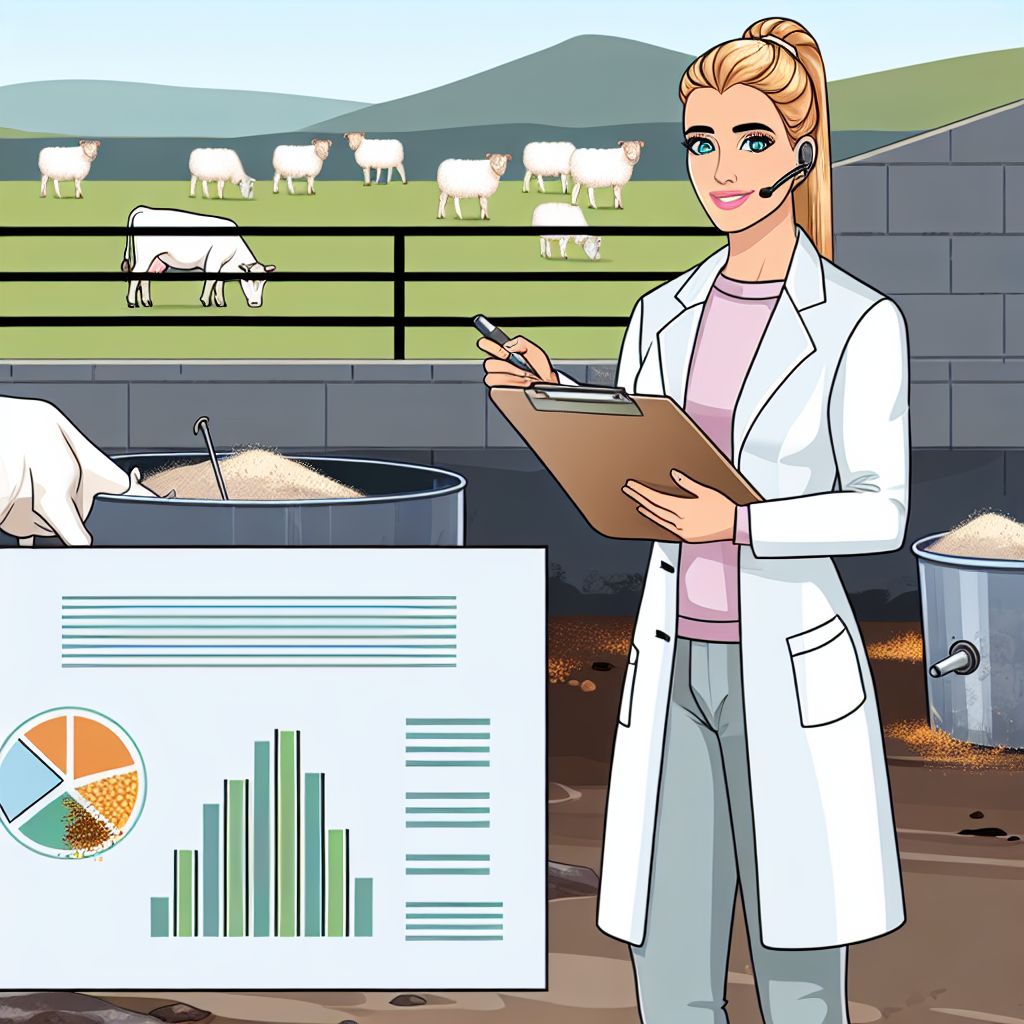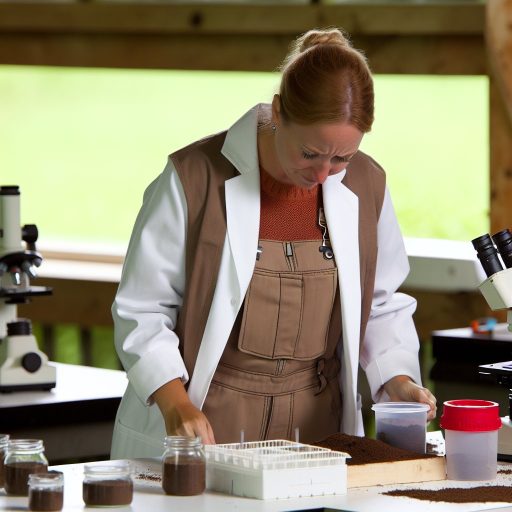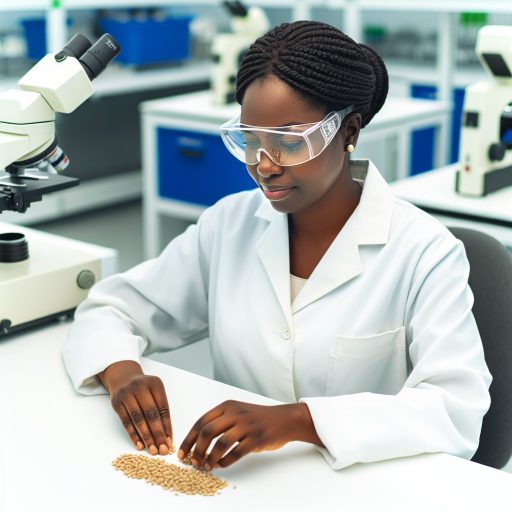Introduction to Livestock Nutrition and Its Importance
Livestock nutrition plays a crucial role in animal health and productivity.
Proper nutrition ensures that animals receive essential nutrients for growth.
Additionally, it helps maintain their immune systems and overall well-being.
Understanding Animal Nutritional Needs
Different types of livestock have unique dietary requirements.
Cattle, pigs, sheep, and poultry all need specific nutrients.
Protein, carbohydrates, vitamins, and minerals contribute to their health.
Nutritionists carefully assess these needs based on animal species.
The Role of Livestock Nutritionists
Livestock nutritionists design balanced diets tailored to individual animals.
They analyze feed components to optimize nutritional value.
This analysis often includes evaluating ingredients, additives, and supplements.
Moreover, they keep abreast of the latest research and advancements.
Consequences of Poor Nutrition
Inadequate nutrition can lead to health issues in livestock.
Animals may suffer from stunted growth and reduced reproduction rates.
Additionally, they may become more susceptible to diseases.
Ultimately, poor nutrition can result in significant economic losses.
Enhancing Efficiency and Productivity
Well-nourished livestock typically perform better than those with poor diets.
Higher productivity translates to increased profitability for farmers.
Nutritionists help producers maximize feed efficiency and weight gain.
In turn, this leads to sustainable and responsible farming practices.
Importance of Livestock Nutrition in Agriculture
Effective livestock nutrition is vital for both animal health and agricultural success.
Investing in sound nutritional practices supports food security globally.
Understanding Nutrient Requirements for Different Animal Species
Different Nutritional Needs
Each animal species has unique nutrient requirements.
For example, cattle require a high intake of fiber.
In contrast, swine thrive on energy-dense diets.
Similarly, poultry need a balanced mix of proteins and vitamins.
Unlock Your Career Potential
Visualize a clear path to success with our tailored Career Consulting service. Personalized insights in just 1-3 days.
Get StartedKey Nutrients
Understanding key nutrients is essential for optimal health.
Proteins support growth and muscle development.
Carbohydrates provide energy for daily activities.
Vitamins and minerals play crucial roles in metabolic functions.
Life Stages Matter
Nutritional needs change throughout an animal’s life.
Young animals often require higher protein levels for growth.
Conversely, mature animals may need a more balanced diet.
Pregnant and lactating females have heightened nutritional demands.
Species-Specific Strategies
Livestock nutritionists employ species-specific strategies.
They assess factors like age, weight, and health status.
Individual diets are tailored based on these assessments.
This approach enhances overall animal well-being.
Balancing Nutrient Intake
Balancing nutrient intake is vital for performance.
Over-supplementation can lead to health issues.
Poor nutritional balance can also reduce productivity.
Thus, consistent monitoring is crucial.
The Role of Nutritionists
Nutritionists play an essential role in animal health.
They formulate diets that meet specific nutrient profiles.
Through research, they stay informed about current trends.
Consequently, they provide valuable guidance to farmers.
Role of Livestock Nutritionists in Diet Formulation
Understanding Nutritional Needs
Livestock nutritionists assess the specific dietary requirements of various animal species.
They use research and field data to create nutrition profiles for each species.
Moreover, they consider factors such as age, weight, and production goals.
Diet Formulation
The primary responsibility of nutritionists is formulating balanced diets.
They ensure that diets contain essential nutrients necessary for animal health.
This process involves selecting appropriate feed ingredients to meet nutrient requirements.
Additionally, they use software tools to analyze and optimize diets.
Research and Development
Nutritionists conduct research to advance the understanding of livestock nutrition.
They study the effects of different feed additives on animal performance.
Through trials, they determine optimal feeding strategies that enhance health and productivity.
Quality Control
Another important role is ensuring feed quality and safety.
Nutritionists monitor feed manufacturing processes to comply with standards.
They conduct regular inspections to prevent contamination and maintain high quality.
Consultation and Education
Nutritionists often provide consultation services to livestock producers.
They educate farmers about proper feeding techniques and nutrition management.
Furthermore, they help producers implement dietary changes to optimize production.
Assessing Animal Health
Livestock nutritionists regularly evaluate the health of animals under their care.
They analyze the relationship between diet and various health indicators.
This assessment allows them to make necessary adjustments to improve overall health.
Collaboration with Veterinarians
Nutritionists often collaborate with veterinarians for a holistic approach to animal health.
Together, they address issues related to nutrition and disease prevention.
Such teamwork helps in developing integrated health management plans.
You Might Also Like: Starting a Career in Seed Technology in Canada
Impact of Nutrition on Animal Growth and Development
Essential Nutrients for Growth
Animals require a variety of nutrients for optimal growth.
Proteins play a crucial role in building and repairing tissues.
Carbohydrates provide the energy necessary for daily activities.
Fats are vital for energy storage and cell function.
Vitamins and minerals support various bodily functions, enhancing overall health.
Each nutrient must be balanced to promote effective growth rates.
Role of Nutritionists in Animal Farming
Livestock nutritionists analyze dietary needs for different species.
They formulate rations tailored to specific life stages and production goals.
Regular adjustments ensure that nutritional requirements are met effectively.
Nutritionists monitor animal growth and health indicators over time.
By doing so, they can modify dietary plans to optimize performance.
Consequences of Poor Nutrition
Inadequate nutrition can lead to stunted growth and poor health.
Disease resistance decreases alongside poor dietary practices.
Consequently, animal welfare suffers, impacting productivity.
Malnourished animals may require more veterinary interventions.
This increases costs and reduces overall farm profitability.
Benefits of Proper Nutritional Management
Effective nutrition supports healthier animals with improved growth rates.
Healthy livestock produce higher quantities of milk and meat.
Nutrition management can enhance reproduction rates in breeding stock.
Additionally, it contributes to the sustainability of farming practices.
Farmers experience reduced costs associated with health issues.
Overall, proper nutrition promotes both animal welfare and economic viability.
Discover More: Understanding Seed Germination and Viability Testing
Analysis of Feed Ingredients and Their Nutritional Value
Importance of Nutritional Analysis
Nutritional analysis is crucial for livestock health.
It ensures animals receive essential nutrients.
Consequently, it supports optimal growth and productivity.
Nutritional imbalances can lead to health issues.
Understanding Feed Ingredients
Feed ingredients vary in nutritional content.
The key is to identify quality sources.
Common ingredients include grains, proteins, and minerals.
Each ingredient serves a specific purpose.
Grains as Primary Energy Sources
Grains are major energy providers in livestock feed.
They include corn, barley, and wheat.
Corn is particularly popular due to its high energy density.
However, too much grain can lead to digestive problems.
Proteins for Growth and Repair
Proteins are vital for growth and muscle repair.
Soybean meal is a common protein source.
Animal by-products also provide high-quality protein.
Balancing protein levels is important for livestock health.
Minerals and Vitamins for Overall Health
Minerals play a critical role in various bodily functions.
Calcium and phosphorus are essential for bone health.
Trace minerals like zinc and copper support immune function.
Vitamins are equally important for metabolic processes.
Evaluating Nutritional Value
Nutritional value depends on various factors.
Moisture content affects the energy density of feeds.
Additionally, the digestibility of ingredients matters.
Nutritional testing helps determine these qualities.
Balancing Rations for Livestock
Balancing rations is a skill of livestock nutritionists.
They formulate diets based on specific livestock needs.
This includes age, weight, and production stage.
Such precision improves feed efficiency and animal health.
Monitoring and Adjusting Diets
Regular monitoring ensures optimal nutritional intake.
Nutritionists adjust diets based on health assessments.
This proactive approach helps in preventing deficiencies.
Ultimately, it leads to healthier, more productive animals.
You Might Also Like: How Arborists Diagnose and Treat Tree Diseases
Importance of Balanced Nutrition for Disease Prevention
The Role of Nutrition in Animal Health
Balanced nutrition plays a critical role in maintaining animal health.
Nutrient deficiencies can lead to weakened immune systems.
Healthy animals are less susceptible to diseases.
Nutritionists ensure livestock receive a comprehensive diet.
Key Nutrients and Their Benefits
Essential nutrients include proteins, vitamins, and minerals.
Proteins are vital for growth and repair of body tissues.
Vitamins support metabolic functions and immune health.
Minerals like calcium and phosphorus strengthen bones and teeth.
Overall, these nutrients contribute to better health outcomes.
Strategies for Preventing Nutritional Deficiencies
Regular dietary assessments help identify nutrient gaps.
Formulating balanced rations is critical for livestock diets.
Using high-quality feed ingredients enhances nutrient availability.
Working closely with veterinarians ensures health goals are met.
The Impact of Nutrition on Disease Resistance
Well-nourished livestock display stronger disease resistance.
Research shows a clear link between nutrition and immunity.
Vaccination efforts are more effective in well-fed animals.
Consequently, effective nutrition leads to improved herd health.
Case Studies of Nutritional Interventions
Numerous studies highlight successful nutritional interventions.
Incorporating specific supplements can reduce illness rates.
Field trials reveal significant health improvements in livestock.
For instance, adding probiotics can enhance gut health.
Future Directions in Livestock Nutrition
Advancements in research continue to shape nutritional strategies.
Precision nutrition is emerging as a key focus area.
Tailoring diets to individual animal needs enhances benefits.
Ultimately, nutritionists play an essential role in animal health.
Uncover the Details: Career Benefits of Pursuing Soil Science in Canada

Strategies for Enhancing Digestion and Absorption in Livestock
Understanding Nutritional Needs
Livestock require a balanced diet for optimal health.
Each animal has specific nutritional needs based on its species and life stage.
Nutritionists perform dietary assessments to identify these needs.
By analyzing feed ingredients, they determine nutrient profiles.
Enhancing Forage Quality
High-quality forages significantly improve digestion.
Nutritionists recommend testing forages for nutrient content.
They suggest proper harvesting and storage techniques to preserve nutrients.
This ensures that livestock receive optimal fiber and energy.
Implementing Feed Additives
Feed additives can enhance gut health and nutrient absorption.
Probiotics support beneficial gut bacteria populations.
Enzymes help break down complex feeds for better digestion.
Nutritionists tailor these additives to specific livestock types.
Balancing Macronutrients
Proper balance of macronutrients is essential for livestock health.
Carbohydrates, proteins, and fats must be in the right ratios.
Nutritionists adjust diets to meet energy and growth requirements.
This balance supports body condition and productivity.
Monitoring and Adjusting Diets
Regular monitoring helps ensure diets remain effective.
Nutritionists observe livestock health and performance indicators.
They adjust diets based on growth rates and health status.
This ensures that livestock thrive throughout their life stages.
Educating Farmers
Education is crucial for effective livestock management.
Nutritionists provide training on best feeding practices.
Workshops and seminars help disseminate valuable information.
Farmers learn about the importance of consistency in feeding.
Utilizing Technology for Precision Feeding Systems
Understanding Precision Feeding
Precision feeding tailors diets to individual animals.
This approach optimizes nutritional intake based on specific needs.
Livestock nutritionists utilize advanced technology to achieve this goal.
This technology enhances efficiency and reduces waste.
Data Collection and Analysis
Collecting data is essential for effective precision feeding.
Nutritionists gather information through various channels.
For instance, they use sensors that monitor animal behavior.
Additionally, they analyze body condition scores regularly.
This data informs dietary adjustments for optimal health.
Incorporating Software Solutions
Advanced software programs play a crucial role in nutrition management.
These programs analyze data and suggest feeding solutions.
They help streamline operations on farms.
Moreover, they provide real-time updates on feed intake.
This enables immediate adjustments to feeding regimes.
Benefits of Precision Feeding
Precision feeding improves animal health significantly.
It leads to enhanced growth rates and better feed conversion ratios.
This, in turn, increases overall productivity on farms.
Furthermore, it reduces the environmental impact of livestock farming.
Minimizing feed waste contributes to sustainability.
Future Trends in Livestock Nutrition
The future of livestock nutrition lies in further technological advancements.
Innovations such as artificial intelligence are on the rise.
These tools support even more tailored feeding strategies.
As a result, they promise improved health outcomes for livestock.
The incorporation of blockchain may enhance traceability in feed supplies.
Case Studies of Improved Animal Health Through Nutritional Interventions
Enhancing Ruminant Health
In a recent case study, a dairy farm in Wisconsin faced low milk production.
The farm noticed an increase in mastitis cases among its herds.
To address this, nutritionists analyzed the cows’ diets.
They found a deficiency in essential minerals, particularly magnesium and selenium.
The nutritionists adjusted the feed mix accordingly.
After six months, milk production rose significantly.
Mastitis cases decreased by 30% overall.
This case highlights the importance of proper mineral balance.
Optimizing Poultry Nutrition
A poultry operation in Georgia struggled with high mortality rates in broilers.
Nutritionists conducted a thorough evaluation of the feed composition.
They identified inadequate levels of vitamins A and E.
The team reformulated the feed to include these essential vitamins.
Post-intervention, mortality rates dropped by 25% within weeks.
The broilers also showed improved growth rates and better overall health.
This demonstrates how optimized feed can positively impact poultry resilience.
Improving Swine Performance
A swine farm in Iowa reported poor weight gain in piglets during weaning.
The nutritionist implemented a specialized weaning diet rich in probiotics.
They also introduced new feed additives to enhance nutrient absorption.
As a result, average daily gain improved by 15% within two months.
Piglets exhibited less stress and better gut health.
This case illustrates the effectiveness of tailored diets during critical growth phases.
Beef Cattle Nutritional Strategies
A beef ranch in Texas faced challenges with cow fertility rates.
Nutritional assessments showed that the cows lacked omega-3 fatty acids.
The nutritionists developed a feeding program to include flaxseed oil.
Following the intervention, fertility rates increased by 20% in one breeding season.
Cows also saw improved body condition scores, leading to healthier calves.
This effectively highlights the role of specific fatty acids in reproductive health.
Additional Resources
MSU researcher helping dairy industry increase profitability …
Housing, Care and Welfare of Animals | National Agricultural Library




